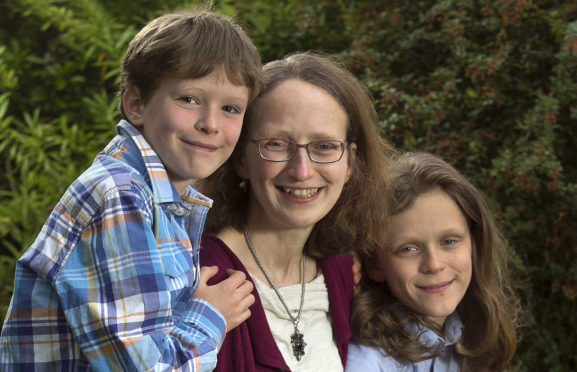
A breast cancer specialist has revealed her own fight against the disease.
Mum-of-two Dr Kay Kelly discovered a lump under her arm as she worked at her busy clinic at Raigmore Hospital in Inverness.
Kay, 51, said: “I was wearing a lightweight blouse and, as I crossed my arms, could feel it, obvious, in my left armpit.
“My immediate thought was that it had appeared in a relatively short time.
“I had checked myself not long before that and realised a sudden lump could be very bad news.
“As a specialist who worked in cancer care for nearly 20 years, I knew the real possibility of cancer.
“All the thoughts and fears that had gone through my patients’ minds now came flooding through mine.”
She waited until after her clinic was finished before seeking out a breast physician and arranged to see her at the end of the day.
“I thought there was no time to dwell and got on with treating patients till then,” said Kay.
The lump was suspicious enough to merit an immediate biopsy that day.
“I had gone from doctor to patient and experienced all the fears that patients have. This was six years ago when my youngest son was three,” she added.
The following Monday meant driving from Inverness to an outreach cancer clinic in Skye.
Halfway through her patient list, Kay was called by a colleague to say her biopsy results would be ready the next day.
“I knew by the tone of the call that the news was not good,” she revealed.
“Throughout the drive back to Inverness I prepared myself for a diagnosis of cancer.
“I knew only too well that breast cancer is common, and can affect women like me… so why not me, I reasoned.”
Around one in eight women now develops it.
Kay asked to be seen early the next morning at Raigmore’s breast centre.
A colleague, Ian Daltrey, a consultant breast surgeon, broke the news. She had an adenocarcinoma, which meant a mastectomy as soon as possible.
“I can remember saying to Mr Daltrey that I had a clinic starting at 9am. “He and the breast care nurses told me that another doctor would cover my work and I was not to turn up at my clinic.”
Kay had a form of breast cancer called HER2 Positive, and oestrogen receptor negative, grade three.
It is sometimes described as “aggressive”.
“But I always prefer terms like fast-growing because it is more factual,” she said.
“I like to avoid metaphors of violence and aggression because they carry an emotional heft that can be unhelpful.”
Kay now had to break the news to her husband.
“The breast care nurse, Karen Daltrey, phoned him for me,” she recalled.
“Fortunately, his sister was visiting from Australia and he wasn’t alone in the house when she called.”
Breaking the news to her children was the next big hurdle.
They accepted in a matter-of-fact way that children often do and the younger one wanted to know if the operation would hurt.
“When I said I’d be asleep, he asked if the doctor had a bed for me,” said Kay.
“He brought a welcome smile at an anxious time.”
Surgery was followed by chemotherapy and the inevitable fatigue and hair loss.
“My hair fell out and although I tried on wigs, I opted for a stylish hat or scarf instead.
“You look for the positives wherever you can find them with cancer.”
The main treatment decisions were made for Kay by the circumstances.
“For example, there was no question of keeping my breast, or of a reconstruction, because of the tumour’s location and type,” she said.
“I had a left mastectomy and axillary node clearance.”
Moving from doctor to patient meant experiencing first-hand feelings she had known second-hand via patients and family members.
“I was remembering all the times when patients would ask, ‘What would you do if you were me, doctor?’
“I was now in the place where I had been, in imagination, many times before.
“I needed a year off work, then went back part-time. But even after my initial treatment I remained very anxious.”
Going back to work sometimes means the “getting back to normal” cancer patients yearn for.
But for Kay, as an oncologist, it also meant thinking about cancer all the time.
“After another 18 months, my most prominent fears were confirmed, and I was diagnosed with metastatic breast cancer,” she added.
At that point, Kay was more or less forced to retire. She continues on the cancer-fighting Herceptin drug.
“I am grateful that this has given me precious time with my children, now nine and 11,” Kay said.
Herceptin and chemotherapy had its side-effects and her hands and feet eventually became inflamed and painful as a result of a treatment called capecitabine.
“I am inspired by the many patients I have had the privilege of treating over the years… how they cope with the uncertainty and the physical symptoms.
“I have met some very brave people with the most distressing cancers.”
Many patients sent cards or contacted Kay after her diagnosis.
“I was touched by their kindness and support,” she said. “I have more to be grateful for, however.
Previous generations of women with cancer have had to cope with its stigma. But, because they challenged this, I have not felt any of it.”
Breast cancer specialist Dr Kay Kelly

Enjoy the convenience of having The Sunday Post delivered as a digital ePaper straight to your smartphone, tablet or computer.
Subscribe for only £5.49 a month and enjoy all the benefits of the printed paper as a digital replica.
Subscribe